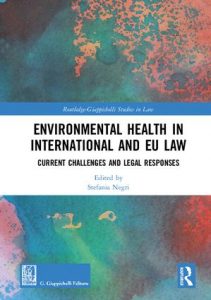
This book presents a broad overview of the many intersections between health and the environment that lie at the basis of the most crucial environmental health issues, focusing on the responses provided by international and EU law. Consistent with the One Health approach and moving from the relevant international and EU legal frameworks, the book addresses some of the most important issues of environmental health including the traditional, such as pollution of air, water and soil and related food safety issues, as well as new and emerging challenges, like those linked to climate change, antimicrobial resistance and electromagnetic fields. Applying an intersectoral and interdisciplinary approach, it also investigates other branches of international and EU law including human rights law, investment law, trade law, energy law and disaster law. The work also discusses ethics and intergenerational equity. Ultimately, the book assesses the degree of effectiveness of the international and EU normative framework, and the extent to which the relevant legal instruments contribute to the protection of public health from major environmental hazards.
Chapters of the book by members of the research group:
- Campins Eritja, M., “Geoengineering: Between the potential to reduce the risks of global warming and to cause irreversible damage to human health and biodiversity”, en Negri, S. (Ed.), Environmental Health in International and European Law: Current Challenges and Legal Responses, Ed. Routledge – Giappichelli, London – Torino, 2019
- Fernández Pons, X., “The Dispute on the Brazilian import ban of retreaded tyres at the WTO: An intersection between trade, health and environment”, en Negri, S. (Ed.), Environmental Health in International and European Law: Current Challenges and Legal Responses, Ed. Routledge – Giappichelli, London – Torino, 2019 (aceptado, fecha prevista de publicación agosto 2019), pp. 41-54.
